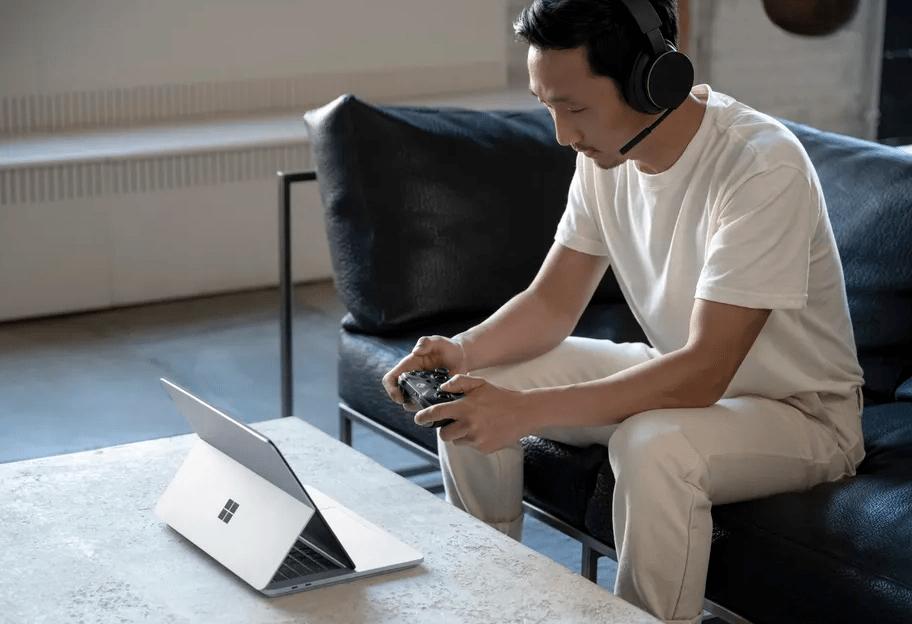I wish Microsoft made an Xbox or Surface gaming laptop
I’ve been waiting years for Microsoft to make a gaming laptop, and the new Surface Laptop Studio still misses the mark. Whether it would be an Xbox laptop or a Surface one, Microsoft has never really come close to building something truly designed for gaming on the go. The Surface Book, Surface Pro, and Surface Laptop all serve different creator types, but none really cater to gamers.
It feels like a missed opportunity, particularly when Microsoft calls Windows 11 “the best Windows ever for gaming,” and the market for gaming laptops has become increasingly lucrative in recent years. Barely a month goes by without a thin and cool gaming laptop being announced, and the line separating laptops from gaming laptops is increasingly blurring thanks to advances in chip designs and cooling.
Microsoft has never marketed the Surface Book as a gaming laptop, but the Surface Laptop Studio comes as close as Microsoft has ever come to embracing PC gaming on a Surface. “Elevate your PC gaming,” says Microsoft on its Surface Laptop Studio product page, adding that the device allows you to “play the latest games with graphics that rival reality.” Microsoft also markets the device with people playing Xbox Game Pass for PC games on the go.
I was hoping the Surface Laptop Studio, a successor to the Surface Book, might capitalize on the interest in gaming laptops. Unfortunately, Microsoft has picked one of the weakest Nvidia GPUs available right now, the RTX 3050 Ti. It can deliver 60fps gameplay in some modern games at 1080p, but it won’t come close to hitting the 120fps needed to make use of the 120Hz panel without seriously knocking game settings down.

I wish Microsoft had gone a step further and added options for an RTX 3070 or RTX 3080. The Surface Laptop Studio supports up to 32GB of RAM and 2TB SSD storage, and it ships with Intel’s 11th Gen Core H processors, so it’s more than capable of gaming with the right GPU. It even has Thunderbolt 4 support, so you could buy an eGPU and attach it for gaming, but you shouldn’t really have to do that to get the best performance on the go.
Microsoft has come close to putting a good GPU inside the Surface Book for years, but the company has always shied away from going full gaming laptop. First there was the Surface Book with its GeForce 940M, then the Surface Book with a Performance Base that upgraded the GPU to a GeForce 965M. Neither were suitable for gaming, but the Surface Book 2 delivered a GTX 1060 on the 15-inch version, which was capable of running a variety of games if you were willing to turn the settings down.
The Surface Book 2 was never really designed for gaming, though. During my review, I noticed performance issues due to throttling and problems with the power supply keeping the device fully charged. Microsoft moved to a GTX 1660Ti Max-Q on the Surface Book 3 and addressed the charging issues, but there were still issues around the dGPU disconnecting randomly.
Microsoft has always struggled to really embrace the PC gaming platform in general, though. While most people use Windows for PC games, it’s Valve’s Steam that they interact with, not the Microsoft Store or Microsoft’s Xbox apps. Microsoft’s many PC gaming failures (let’s not mention Games for Windows Live) have contributed to a lack of focus, and the company’s UWP experiment for Xbox Game Studios titles has just been a headache for installs, updates, and even during gameplay.
So it’s really no surprise Microsoft is hesitant to embrace the PC gaming with its own hardware, even if it does some great DirectX work in the background to improve PC game performance and underlying APIs for developers.
PC gaming is now in a moment of transformation for gaming on the go. There have been a few options for Nintendo Switch-like devices, and Valve’s Steam Deck has thrust the idea into the mainstream. The miniature PC is powered by Linux and, if successful, it could help break the reliance on Windows for PC gaming. Perhaps Microsoft’s even thinking about its own Xbox handheld, as the AMD components Valve is using inside the Steam Deck are also available for competitors to make their own mobile gaming PCs.
Either way, I just wish Microsoft would take PC gaming more seriously both within Windows and with its Xbox / Surface hardware. Gaming laptops are no longer bulky and garish, and I’d love to see what Microsoft could produce if it truly focused on PC gaming on the go.








